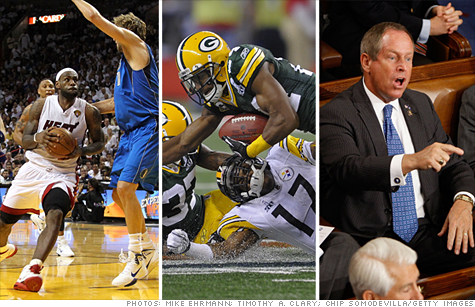Search News

FORTUNE -- From partisan battles in the U.S. government to player-owner clashes in professional sports, it looks like the entire nation is stuck in gridlock. But if today's logjam seems like a product of its times, it's not.
"In many ways, gridlock is endemic to our national politics," Sarah Binder, an expert on governance at the Brookings Institute, has written. It is "the natural consequence of separated institutions sharing and competing for power."
Conflicts between lawmakers are not much different than the fights between players and team owners: Each group has a roster of stubborn power brokers. And every group has the ability to grind our nation's institutions to a halt.
The conflicts
Four months ago NFL owners officially locked out the players' union, as the two sides struggle to agree on how to split the league's revenue. The lockout of 2011 marks the longest in NFL history and is the league's first major labor disagreement since a 1987 strike.
Earlier this month, the NBA followed suit and announced its own lockout when the players' collective bargaining agreement expired. Owners and players disagree on the fundamental structure of the league, with owners alleging that 22 of the NBA's 30 teams are losing money.
The situation is not much different for the U.S. government. Like players and owners, politicos can't agree on how to manage revenue -- in this case tax dollars -- with Republicans unwilling to raise taxes and Democrats hesitating to cut funding for government programs. Think of entitlement programs such as Medicare, Medicaid, and Social Security much like player "guarantees" in the NFL and NBA.
Like Democrats who say retired American workers have a right to government assistance, players say that drastic cuts to their benefits are outrageous and unreasonable. Meanwhile conservatives and owners feel their pockets running low with no guarantee they'll be heavy again.
One can't dismiss the source of the conflict as simple greed. Its base lies in fundamental differences in political and business ideologies for all three institutions. And none of the sides appear to be ready to budge.
The impasse and beyond
The picture for the NFL and NBA is the same. Players from both leagues are locked out of their team facilities and any other league business (no benefits, no pay, etc.) But the future of each fight is different.
The NBA has a long battle ahead. If 22 of its 30 teams are truly losing money, expect the conflict to dig a little deeper between players and owners ahead of a season that is scheduled to start late in the fall. But with the NFL preseason on the horizon, practicality may step in and change the course of events as they've unraveled over the last four months.
"As you get closer to the training camp and start of a new season, the players are in more jeopardy of losing paychecks, and the owners' revenue, so there's a greater sense of urgency to get something done," says Dan Lazaroff, a sports law expert at Loyola Law School. "As you get closer to important deadlines in terms of money being lost, people get down to brass tacks, and they work out the details."
The U.S. government faces an even shorter deadline: an August 2 cutoff to raise the debt ceiling. Failure to do so could result in the unprecedented event of the U.S. defaulting on its financial obligations. For Congress and the White House though, the urgency to get something done doesn't hold up well against the heavy burden of conservative and liberal divides.
"The Republican Party has become far more conservative and ideological, and less willing to cooperate," Lazaroff says. "When I was growing up there were still these difference of philosophies, but the parties were much more amenable to negotiating settlements. You just would not have this debt-ceiling thing going on 20 years ago where there was actually a threat of the country defaulting."
In professional sports, however, Lazaroff notes that the sides aren't so united along party lines. "There are clearly factions among the owners ranging from those who are very hardcore and sort of anti-union to those who want to be more cooperative," he says. "But you can't have professional sports without the athletes, and you can't have professional sports without owners who are willing to take the risks."
The public spectacle of a lockout only becomes hazardous to the leagues' businesses if games are in fact lost or seasons are delayed. There's still time to reach a deal. For the country though, much more is at stake, and time is running out. ![]()
| Overnight Avg Rate | Latest | Change | Last Week |
|---|---|---|---|
| 30 yr fixed | 3.80% | 3.88% | |
| 15 yr fixed | 3.20% | 3.23% | |
| 5/1 ARM | 3.84% | 3.88% | |
| 30 yr refi | 3.82% | 3.93% | |
| 15 yr refi | 3.20% | 3.23% |
Today's featured rates:
| Latest Report | Next Update |
|---|---|
| Home prices | Aug 28 |
| Consumer confidence | Aug 28 |
| GDP | Aug 29 |
| Manufacturing (ISM) | Sept 4 |
| Jobs | Sept 7 |
| Inflation (CPI) | Sept 14 |
| Retail sales | Sept 14 |